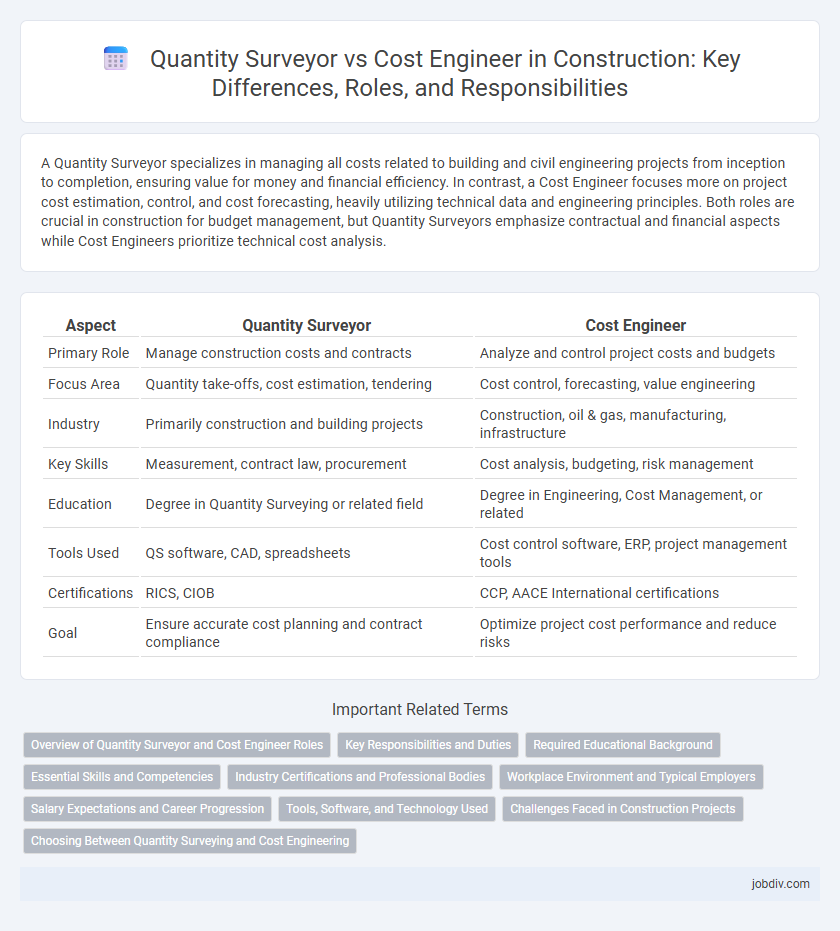A Quantity Surveyor specializes in managing all costs related to building and civil engineering projects from inception to completion, ensuring value for money and financial efficiency. In contrast, a Cost Engineer focuses more on project cost estimation, control, and cost forecasting, heavily utilizing technical data and engineering principles. Both roles are crucial in construction for budget management, but Quantity Surveyors emphasize contractual and financial aspects while Cost Engineers prioritize technical cost analysis.
Table of Comparison
| Aspect | Quantity Surveyor | Cost Engineer |
|---|---|---|
| Primary Role | Manage construction costs and contracts | Analyze and control project costs and budgets |
| Focus Area | Quantity take-offs, cost estimation, tendering | Cost control, forecasting, value engineering |
| Industry | Primarily construction and building projects | Construction, oil & gas, manufacturing, infrastructure |
| Key Skills | Measurement, contract law, procurement | Cost analysis, budgeting, risk management |
| Education | Degree in Quantity Surveying or related field | Degree in Engineering, Cost Management, or related |
| Tools Used | QS software, CAD, spreadsheets | Cost control software, ERP, project management tools |
| Certifications | RICS, CIOB | CCP, AACE International certifications |
| Goal | Ensure accurate cost planning and contract compliance | Optimize project cost performance and reduce risks |
Overview of Quantity Surveyor and Cost Engineer Roles
Quantity Surveyors specialize in managing construction costs, providing cost estimates, tender analysis, and contract administration to ensure projects stay within budget. Cost Engineers focus on cost control, risk analysis, and project financial forecasting, integrating engineering principles with cost management to optimize overall project efficiency. Both roles collaborate closely to align technical specifications with financial objectives in construction projects.
Key Responsibilities and Duties
Quantity Surveyors primarily manage project costs by preparing detailed cost estimates, conducting feasibility studies, and managing contract documentation to ensure budget compliance. Cost Engineers focus on cost control through cost forecasting, value engineering, and risk analysis to optimize financial performance and resource allocation throughout the construction lifecycle. Both roles collaborate to deliver accurate financial reports, track expenditures, and support project decision-making with precise cost data.
Required Educational Background
Quantity Surveyors typically hold a degree in Quantity Surveying, Construction Management, or Civil Engineering, emphasizing contracts, cost estimating, and project management. Cost Engineers often possess educational qualifications in Engineering disciplines such as Mechanical, Civil, or Industrial Engineering, with specialized training in cost control, risk analysis, and project economics. Both roles require strong analytical skills and expertise in construction costs, but Quantity Surveyors have a more focused curriculum on legal and contract aspects, while Cost Engineers emphasize technical and engineering cost assessment.
Essential Skills and Competencies
Quantity Surveyors excel in contract management, cost estimation, and value engineering, ensuring accurate budgeting and financial control on construction projects. Cost Engineers possess strong analytical skills, proficiency in cost control software, and expertise in risk management to optimize project expenses and schedules. Both roles require exceptional communication, problem-solving abilities, and a deep understanding of construction methodologies to deliver cost-effective solutions.
Industry Certifications and Professional Bodies
Quantity Surveyors commonly pursue certifications from the Royal Institution of Chartered Surveyors (RICS), which is globally recognized for maintaining industry standards in construction cost management. Cost Engineers often obtain credentials through the Association for the Advancement of Cost Engineering (AACE) International, specializing in cost estimation and project control certifications. Both professional bodies provide rigorous certification processes that enhance credibility, with RICS emphasizing quantity surveying and contract management, while AACE focuses on cost engineering methodologies and project lifecycle analysis.
Workplace Environment and Typical Employers
Quantity Surveyors typically work on-site at construction projects, collaborating closely with contractors, architects, and client representatives to manage contracts and costs. Cost Engineers are often employed by engineering firms, construction companies, or consultancy agencies, with a focus on both office-based project planning and fieldwork involving cost estimation and control. Both roles require interaction with diverse stakeholders in dynamic workplace environments, but Quantity Surveyors usually have a stronger presence on-site, while Cost Engineers balance between technical offices and project locations.
Salary Expectations and Career Progression
Quantity Surveyors typically earn between $50,000 and $85,000 annually, with senior roles reaching up to $120,000, reflecting expertise in contract management and cost control. Cost Engineers command salaries ranging from $60,000 to $95,000, increasing to $130,000 for advanced positions involving detailed project cost analysis and risk assessment. Career progression for Quantity Surveyors often leads to senior consultancy or project management roles, while Cost Engineers may advance into specialized risk management or financial planning positions within construction firms.
Tools, Software, and Technology Used
Quantity Surveyors primarily use cost estimation software like CostX and Sage, along with BIM (Building Information Modeling) tools to measure materials and track expenses accurately. Cost Engineers focus on advanced project control software such as Primavera P6 and MS Project for scheduling and cost management, integrating risk analysis and forecasting tools. Both roles leverage digital technologies, but Quantity Surveyors emphasize detailed cost tracking while Cost Engineers prioritize comprehensive project cost control through integrated software platforms.
Challenges Faced in Construction Projects
Quantity Surveyors often face challenges in accurate cost estimation and managing contract variations, which can lead to budget overruns. Cost Engineers struggle with integrating technical project data and controlling project expenses amid fluctuating material prices and labor rates. Both roles require precise cost control and forecasting to mitigate financial risks and ensure project profitability.
Choosing Between Quantity Surveying and Cost Engineering
Choosing between Quantity Surveying and Cost Engineering depends on the project's scope and specific cost management needs. Quantity Surveyors specialize in contract administration, cost estimation, and procurement processes, ensuring financial control throughout construction projects. Cost Engineers focus on cost control, risk analysis, and value engineering, optimizing expenses through technical and economic evaluations.
Quantity Surveyor vs Cost Engineer Infographic

 jobdiv.com
jobdiv.com